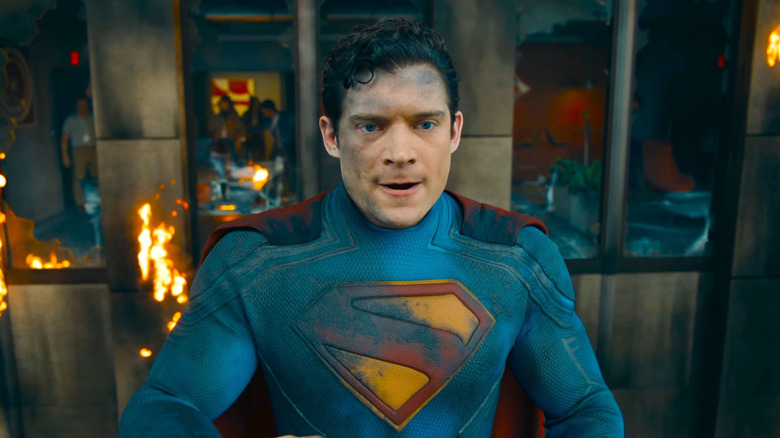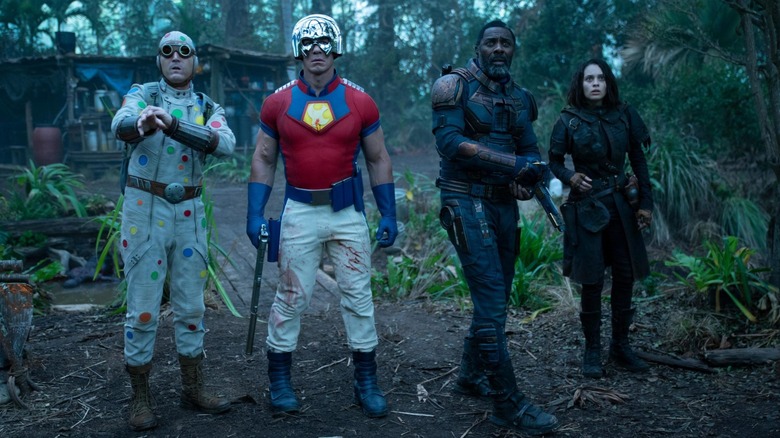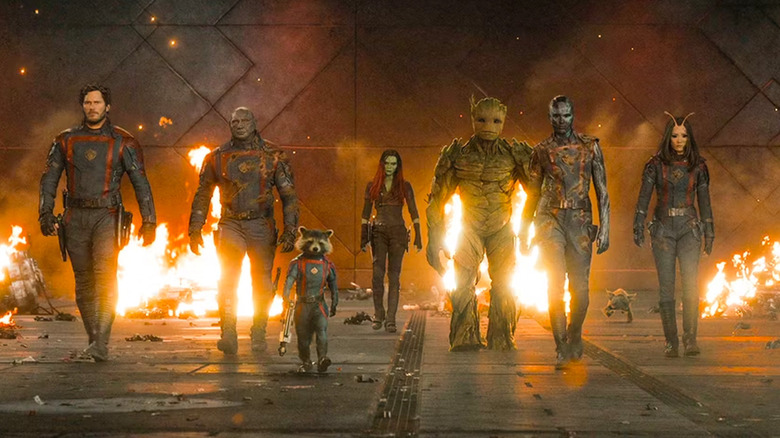James Gunn's Theory About Why The Movie Industry Is 'Dying' Is Spot-On
It's no secret the theatrical experience have been on the wane for a hot minute. The COVID-19 pandemic, of course, took a heavy toll on movie theaters; per a report by the Cinema Foundation (via The Hollywood Reporter), the number of active screens in the United States shrunk from 41,172 in 2019 to 39,007 in 2022. That number has bounced back slightly in the years since then, though, while worldwide ticket sales have also been slowly increasing. At the same time, we've yet to see annual box office receipts come near to matching the massive glut of 2019 in the pandemic era. That year saw $11.23 billion in ticket sales at the domestic box office. 2020, thanks to COVID-19, only saw $2.02 billion in ticket sales stateside, with that number ticking back up to $8.96 billion in 2023 before it dropped off a bit in 2024 to $8.62 billion.
These numbers, however, only add to a general (bleak) milieu wherein feature films, as a cultural force, seem to be on the wane. People, it seems, simply don't watch movies as much anymore (at least not in theaters), while kids aren't obsessed with scripted TV shows or feature films the way they were just a generation ago. (Anecdotally speaking: The 10-year-olds I know don't really watch movies.) We cinephiles hold out for major hits — and they do pop up frequently — but many of us can see that the once unshakeable cinematic monoculture of the late 20th century has long since been shaken.
This brings us to James Gunn, the director of several notable superhero flicks and a filmmaker who is currently in charge of rebooting DC Comics' shared universe of characters in film and TV, with Gunn's upcoming "Superman" serving as the first movie in his and Peter Safran's new DC Universe. Gunn, having seen his share of both hits (his "Guardians of the Galaxy" films) and flops (his "The Suicide Squad," though that was largely due to the pandemic), agrees that movie theaters are shrinking as a popular venue for film consumption — and he has a very palpable reason as to why that might be.
Gunn thinks mainstream filmmaking has gotten sloppy and rushed
As Gunn explained to Rolling Stone:
"I do believe that the reason why the movie industry is dying is not because of people not wanting to see movies. It's not because of home screens getting so good. [...] The number-one reason is because people are making movies without a finished screenplay."
For years, cinema pundits have, as Gunn observed, cited the diminishing interest in film and improvements in home setups as the reasons movie theaters are on the decline. Many people prefer to watch films in the comfort of their own homes where they can be uninterrupted and have stated they don't like attending movies in public, as they bristle at the rude behavior of their fellow filmgoers. (Even Martin Scorsese feels this way.) Also, there are too many commercials at most multiplexes, often tacking 30 to 40 minutes of additional theater time to the average movie. And again, these issues have only been compounded by the constant improvements in home-viewing technology, as some movie fans seem to feel that a 4K TV and high-quality streaming tech is superior to a modern projector.
To Gunn's latter point, though, he knows what he's talking about. Gunn has spent the last 12 years of his career making effects-heavy superhero blockbusters for major studios like Disney and Warner Bros., and he seems to have witnessed, first hand, the sloppy filmmaking that goes into them. As has been reported before, Marvel Studios (for whom Gunn made his "Guardians" movies) has infamously engaged in bitter and unhealthy underbidding wars while looking for VFX houses it can hire for the cheapest price. It's also an open secret that Marvel executives often make big changes to films at the last minute, forcing VFX artists to work overtime to re-do what they've already finished. It's the reason why super-expensive, visual effects-forward movies can still come out looking so cheap.
Gunn doesn't want the DCU to repeat Marvel's mistakes
The Marvel machine, it should be remembered, is an assembly line overseen by executive producer Kevin Feige. Likewise, the initial selling point of the Marvel Cinematic Universe was that its films would interconnect like the episodes of a massively expensive TV show. As such, a lot of the characters, costume designs, plot points, and action sequences in MCU movies have been picked out and, in some cases, largely finalized before a director is hired or a script is finished. Just ask director Lucrecia Martel, who was told explicitly that if she wanted to call the shots on "Black Widow," then she wouldn't have to sweat the action scenes.
This, as Gunn implied, has hurt the MCU film series and blockbusters in general. It's filmmaking by committee, with writers and directors becoming mere workmen delivering a product. Not only does an artist's stamp vanish in such a system, but it also doesn't take too long for stories to begin suffering as well. This may well be why recent MCU films like "Captain America: Brave New World," "The Marvels," and "Ant-Man and the Wasp: Quantumania" have all felt roughshod and rushed; it's possible, even likely, cameras began to roll before a final script draft had been completed. Major studios are now engaging in the same by-the-seat-of-your-pants philosophy once employed by B-movie luminaries like Roger Corman.
By comparison, Gunn has said on multiple occasions he wants the DCU to be more director-friendly. He would also prefer that a script be finalized before filming begins. Time will tell if Gunn's philosophy can produce a better and more popular breed of blockbuster ... or if mainstream cinema will continue to wane.
"Superman" hits theaters on July 11, 2025.


